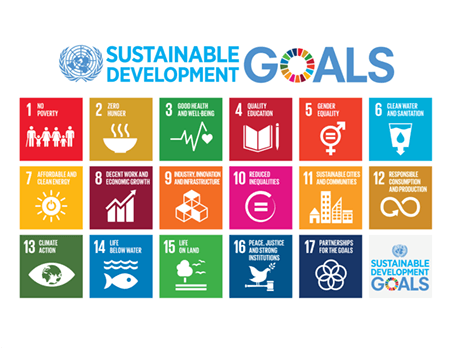The 2030 Agenda for Sustainable Development, was adopted by all United Nations Member States in 2015. It provides a shared blueprint for peace and prosperity for people and the planet, now and into the future.
There are 17 goals:
– Goal 1. End poverty in all its forms everywhere
– Goal 2. End hunger, achieve food security and improved nutrition and promote sustainable agriculture
– Goal 3. Ensure healthy lives and promote well-being for all at all ages
– Goal 4. Ensure inclusive and equitable quality education and promote lifelong learning opportunities for all
– Goal 5. Achieve gender equality and empower all women and girls
– Goal 6. Ensure availability and sustainable management of water and sanitation for all
– Goal 7. Ensure access to affordable, reliable, sustainable and modern energy for all
– Goal 8. Promote sustained, inclusive and sustainable economic growth, full and productive employment and decent work for all
– Goal 9. Build resilient infrastructure, promote inclusive and sustainable industrialization and foster innovation
– Goal 10. Reduce inequality within and among countries
– Goal 11. Make cities and human settlements inclusive, safe, resilient and sustainable
– Goal 12. Ensure sustainable consumption and production patterns
– Goal 13. Take urgent action to combat climate change and its impacts*
– Goal 14. Conserve and sustainably use the oceans, seas and marine resources for sustainable development
– Goal 15. Protect, restore and promote sustainable use of terrestrial ecosystems, sustainably manage forests, combat desertification, and halt and reverse land degradation and halt biodiversity loss
– Goal 16. Promote peaceful and inclusive societies for sustainable development, provide access to justice for all and build effective, accountable and inclusive institutions at all levels
– Goal 17. Strengthen the means of implementation and revitalize the global partnership for sustainable development
The UNDP with the contribution of many nations, have created 17 sustainable development goals (SDGs), among which are the eradication of poverty, achieving zero hunger, good health and well-being, quality education and gender equality. The objective was to produce a set of universal goals that meet the urgent environmental, political and economic challenges facing our world.
ICT was integral to the 8 Millenium Development Goals (MDGs] that began in 2000 with the purpose of eradicating poverty and promoting sustainability. Target 8f stated that “In cooperation with the private sector, make available the benefits of new technologies, especially information and communications.”(ITU). A framework of 8 goals, 18 targets and 48 indicators to measure progress towards the Millennium Development goals was adopted by a consensus of experts from the United Nations Secretariat and IMF, OECD and the World Bank. (ITU).
The SDGs, on the other hand, have different goals:
1- first, growth: enable and foster access to and increased use of telecommunication/ICT;
2- second, Inclusiveness: bridge the digital divide and provide broadband for all;
3- third, sustainability: manage challenges resulting from telecommunication/ICT development, and Innovation and partnership: and
4- fourth, lead, improve and adapt to the changing telecommunication/ICT environment (ITU).
The 17 Sustainable Development Goals (SDGs) are considered an urgent call for action by all countries – developed and developing – in a global partnership, achieved by 2030. They recognize that ending poverty and other deprivations must go hand-in-hand with strategies that improve health and education, reduce inequality, and spur economic growth. They must also tackle climate change and work to preserve our oceans and forests.

